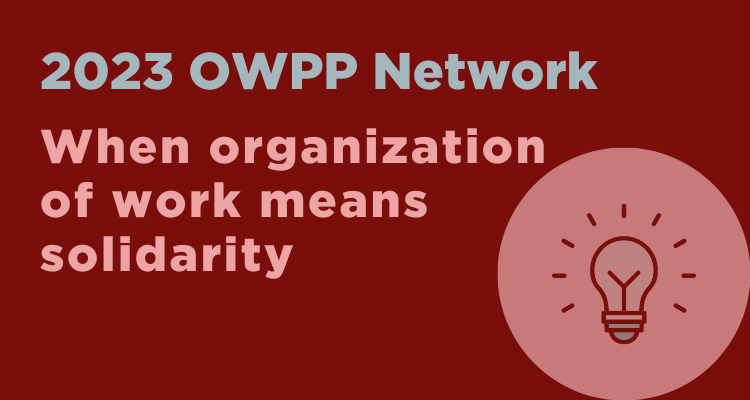
When organization of work means solidarity
The 2023 edition of the Organization of Work and Professional Practice (OWPP) Network, held on January 23 and 24, 2023, was an opportunity for participants to discuss the different leverage for union action available to them and to better understand the collective and mobilizing scope of organization of work.
Organization of work: a mobilizing and collective issue
Union interventions on organization of work issues are decisive in changing the relationship with work and acting on what affects the quality of life at work. Sometimes, it is not enough to allocate staff appropriately for a transformation in organization of work and workload to take place.
To succeed in identifying organization of work problems, it is essential that healthcare professionals are at the heart of the action and mobilization. They are in the best position to identify the problems and find the solutions.
Intervention in organization of work is wide-ranging and several elements must be considered: the level of qualifications, versatility, the expected tasks and how they are distributed, the criteria of quality, schedules and many others. It is these elements that were discussed by Professor Geneviève Baril-Gingras, who pointed out, among other things, that union action is primarily rooted in the prevention and maintenance of workers’ health.
Case law has enabled the FIQ to draw a “path of intervention”. Hence, a tool presenting six criteria for a workload was presented to participants. It shows the steps of the Committee on Care which has been in the provincial provisions of the collective agreement since 1963.
The OWPP Network participants have also gone to great lengths to demystify union action in organization of work.
Professional practice: obstacles and opportunities
As with organization of work, the issues affecting professional practice are widely and deeply felt. They are a source of mobilization for healthcare professionals.
For the FIQ, professional practice is composed of three main determinants: the scope of practice, organization of work and the working and living conditions at work.
The scope of practice, although defined by a strict legislative framework, is applied with variable geometry in Québec care settings. Often it is even directly proportional to the nursing leadership in the setting. However, whether this leadership is stronger or weaker, it reminds us that the issues surrounding professional practice are opportunities to improve practice and working conditions. They call for union actions.
As Professor Amélie Perron pointed out, it is together, by embracing what makes us experts in care, that we will be able to confront the code of silence culture that exists in the health and social services network. Since the beginning of the pandemic, many healthcare professionals have spoken out to denounce unacceptable care or practice situations. We must continue to break this silence.
To close the Network, the participants had the opportunity to exchange on the research data of Professor Patrick Martin on nursing practice in a speciality. One of the findings that emerged was that healthcare professionals working in specialties are confronted with several constraints, dogmas and medical practices that prevail in the institutions. On their own, they cannot cope with them. Their situation therefore requires a united union and professional response.
In Solidarity!